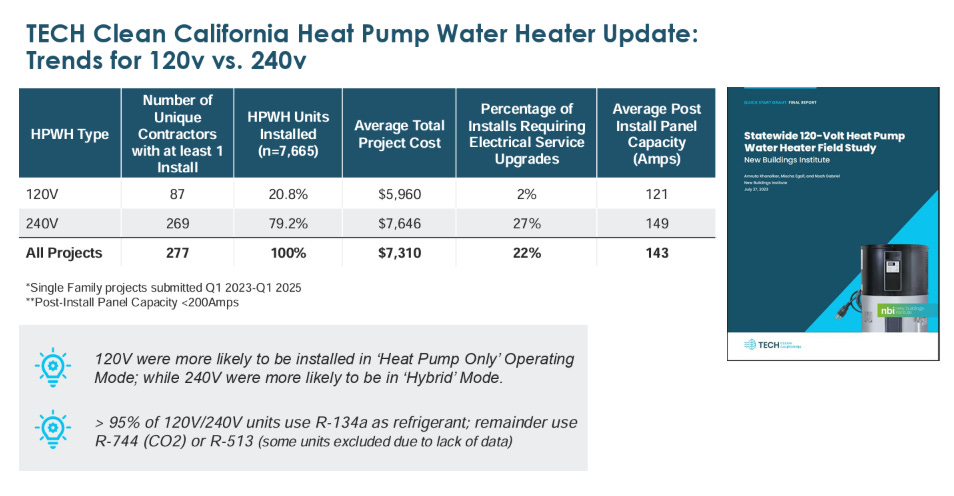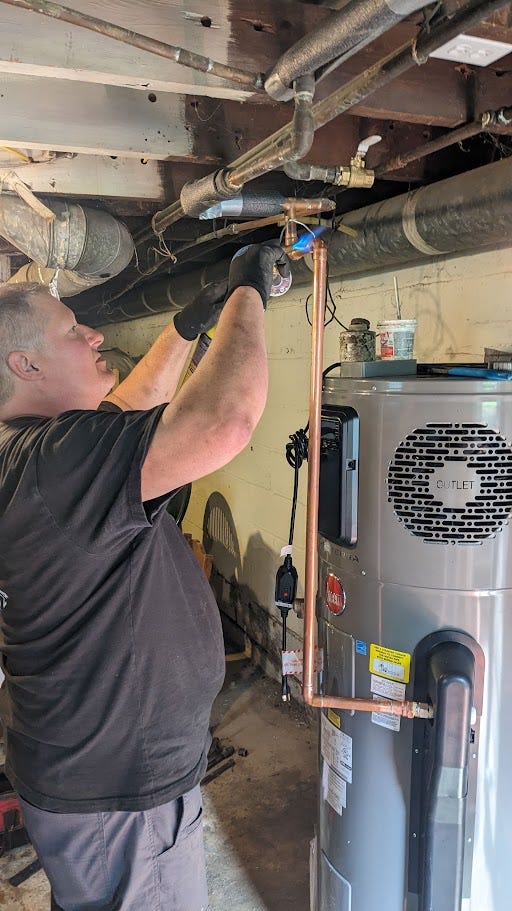Support CleanTechnica’s work through a Substack subscription or on Stripe.
Some interesting data crossed our desk this week out of California. The Tech Clean California program, which provides heat pump and heat pump water heater incentives in California, reported in an earlier meeting this year some significant savings for the 120V plug-in heat pump water heater (HPWH). Their data confirmed what was widely expected but never proven: that the 120-volt heat pump water heater costs less to install and also reduces the need to upsize an electrical panel.
As a little reminder, heat pump water heaters are by far the most efficient way to heat water — 3 to 5 times more efficient than any other technology, including tankless gas heaters. Due to their low energy use, a heat pump water heater will avoid 1 ton of CO2 emissions every year compared to gas water heaters, and save $400–$500 in energy bills compared to electric resistance models.
One challenge with heat pump water heaters up until 2023 was that they had to be hardwired with 240 volts of electricity. This can create difficulties when replacing gas water heaters, which don’t have electricity on site. A homeowner must then run a new electrical line to the water heater location, which can trigger a panel upsizing. In 2023, two manufacturers (Rheem and A.O. Smith) brought 120 volt, plug-in heat pump water heaters to market that can plug into a standard outlet. These units run almost exclusively on their heat pump, avoiding the electrical resistance backup heating that 240V models have.

The TECH program just published a data set that includes a substantial number of 120-volt HPWH installations in the first 2 years since they were brought to market. Of the 7,665 HPWHs that TECH rebated from Q1 2023 to Q1 2025, 21% installed 120-volt HPWHs. These 120V HPWH installations cost, on average, about $1,700 or about 22% less than the 240V HPWH installations. Moreover, only 2% of the 120V HPWHs required an electrical service upgrade, while over a quarter of the 240 volt model HPWHs did.
This is all a big deal. Fewer electrical service upgrades mean that more people can readily get heat pumps when their water heater fails because they won’t have to wait (sometimes weeks) for electricians and permitting offices to approve and do significant electrical work on their home. Reducing costs brings HPWHs within the reach of more customers. The 120-volt heat pump water heater thus has proved it is an important tool to allow homes with gas water heaters to more easily and cost-effectively switch to heat pumps.
We should note that we have heard some concerns from installers and manufacturers about the 120-volt HPWH and its longer recovery times (without electric resistance backup). Large households with more than 4 people or homes with water heaters located outdoors are probably not right for this plug-in model.

Yet, I’ve run the 240-volt heat pump water heater in my home on “heat pump only” mode (where the electric resistance backup is never used), effectively using it as a 120-volt HPWH for 8 years, and we’ve never had a problem. We also installed a 120 volt HPWH in our Cleveland rental two years ago, and it has been performing fantastically well without one complaint.
Finally, manufacturers like GE are now making HPWHs that have the capability to be run on both 120 volts and 240 volts. This next-generation, “flexible voltage” HPWH might just seal the deal by allowing homes to easily install a HPWH when their gas one breaks, plug it into a standard outlet, and then add a 240-volt electrical connection later if they find they are not getting enough hot water.
In any case, it’s exciting to see data that shows significant cost savings from 120-volt HPWHs and significant reductions in electrical upgrades.
Join us on HPWH Day (October 23) to celebrate the glorious heat pump water heater!
Tip of the hat to Ted Tiffany at BDC for drawing our attention to this story.
Sign up for CleanTechnica’s Weekly Substack for Zach and Scott’s in-depth analyses and high level summaries, sign up for our daily newsletter, and follow us on Google News!
Have a tip for CleanTechnica? Want to advertise? Want to suggest a guest for our CleanTech Talk podcast? Contact us here.
Sign up for our daily newsletter for 15 new cleantech stories a day. Or sign up for our weekly one on top stories of the week if daily is too frequent.
CleanTechnica uses affiliate links. See our policy here.
CleanTechnica’s Comment Policy



